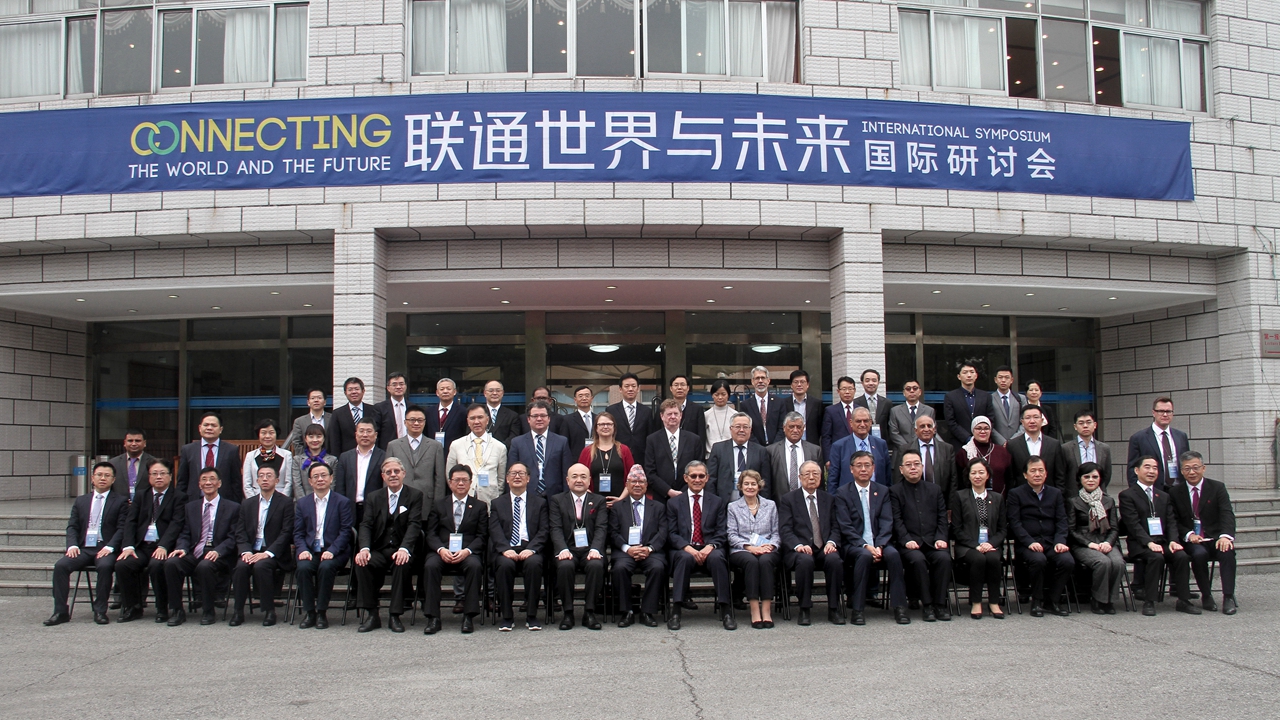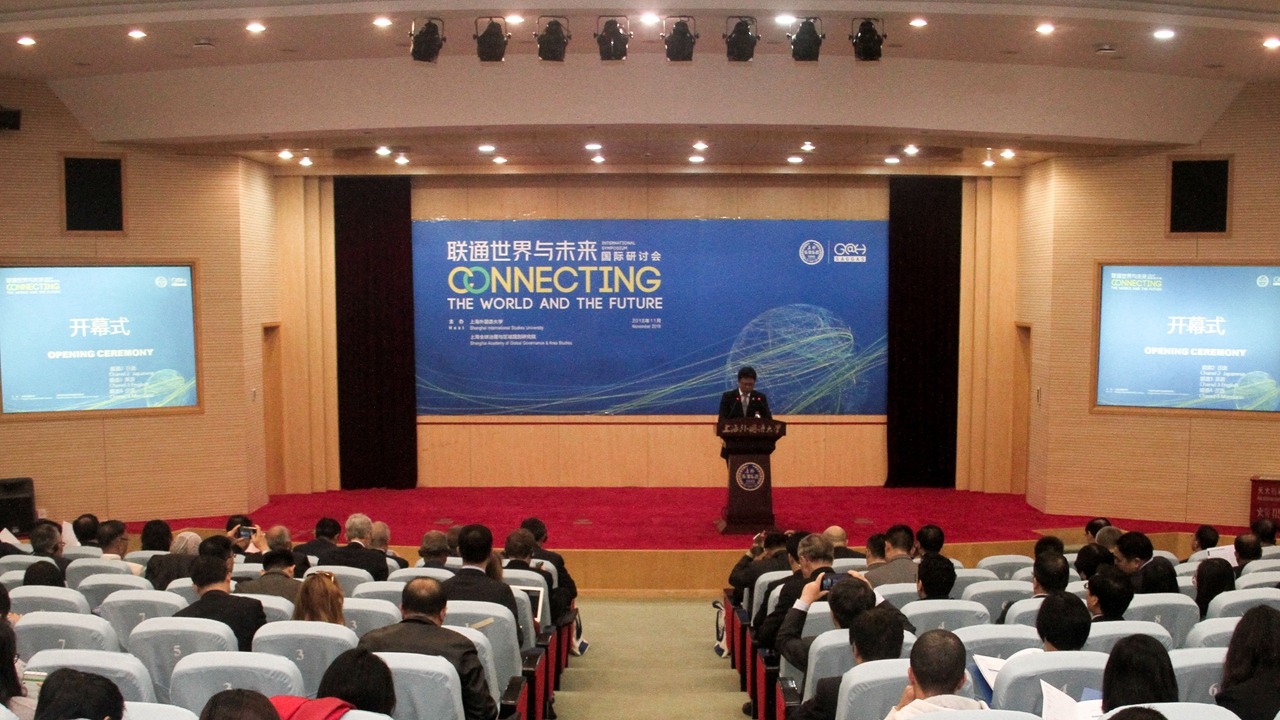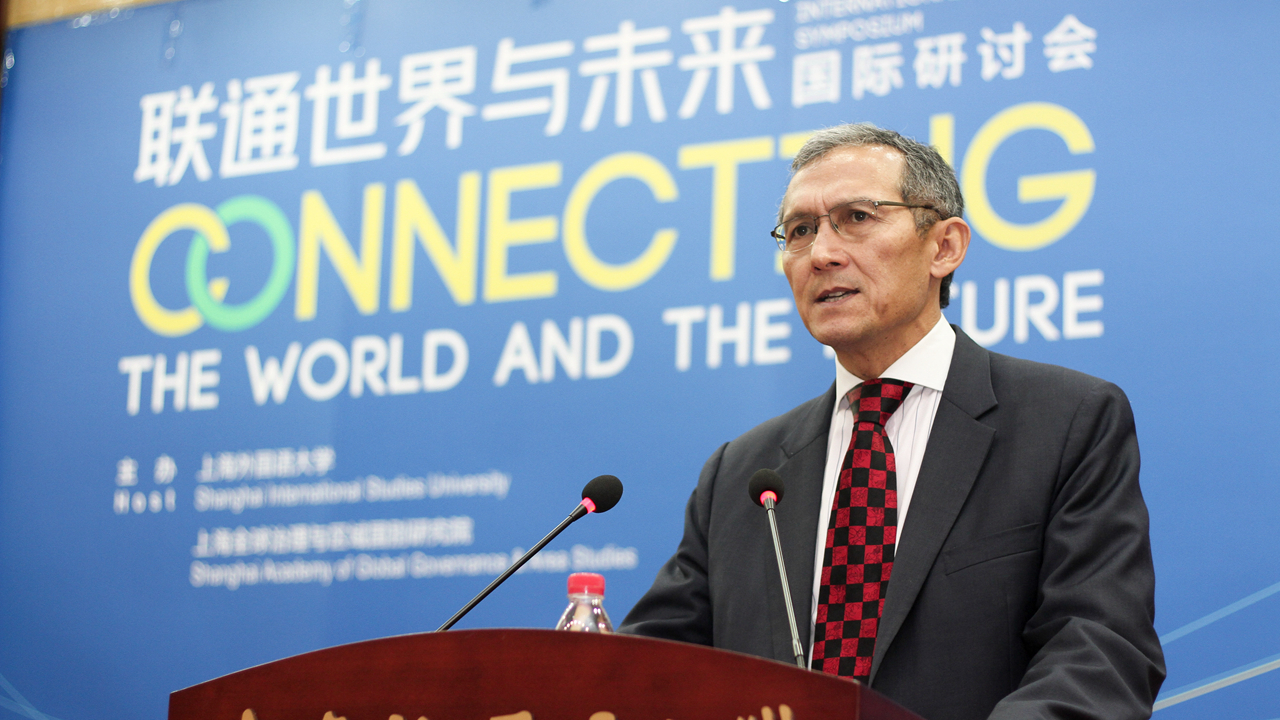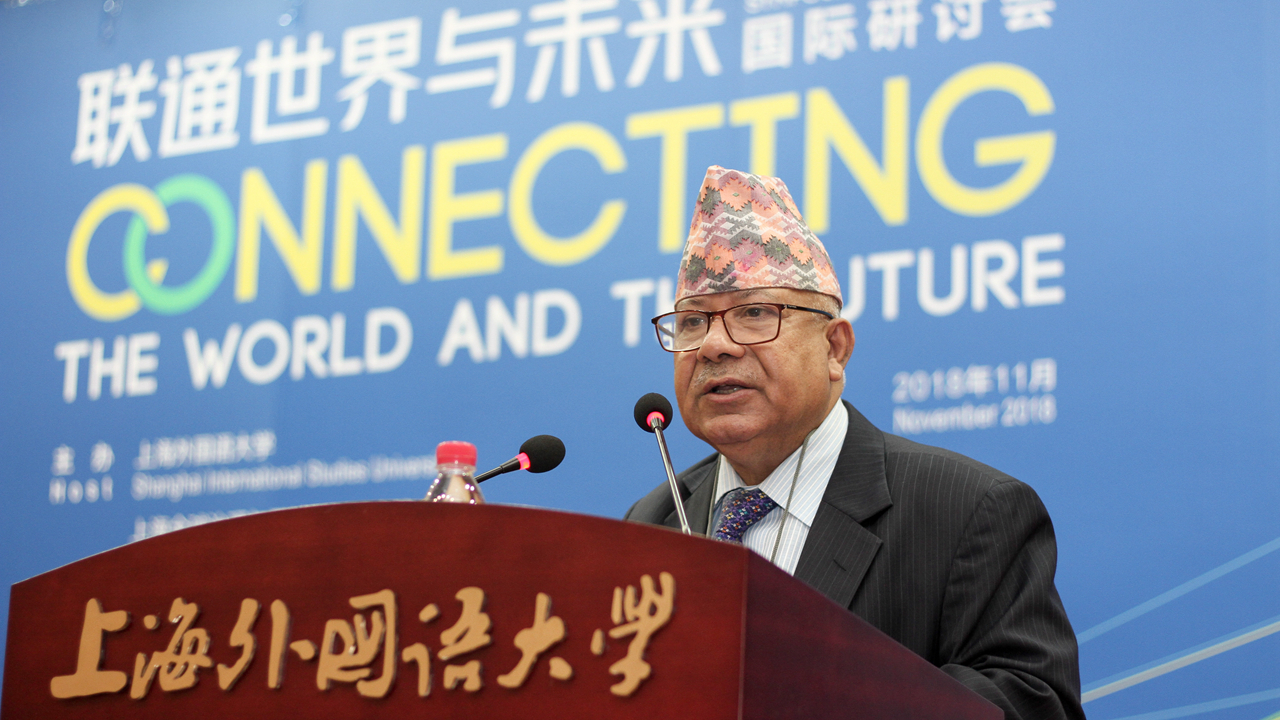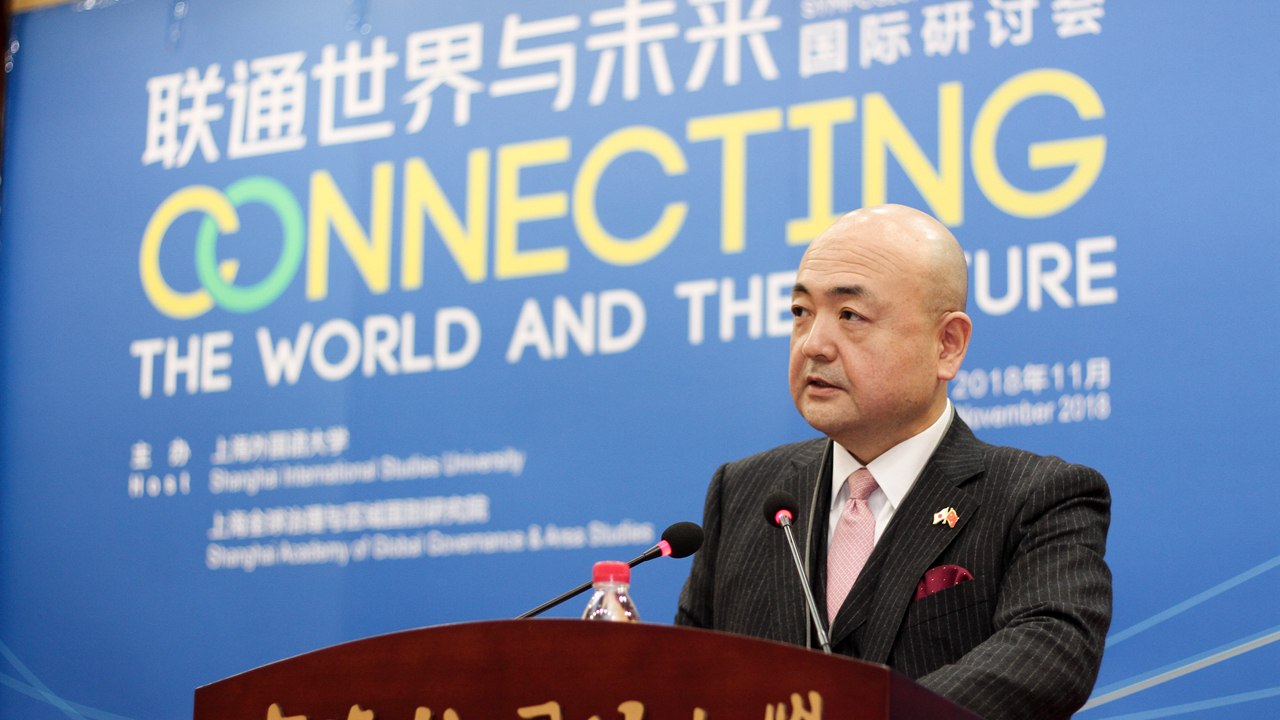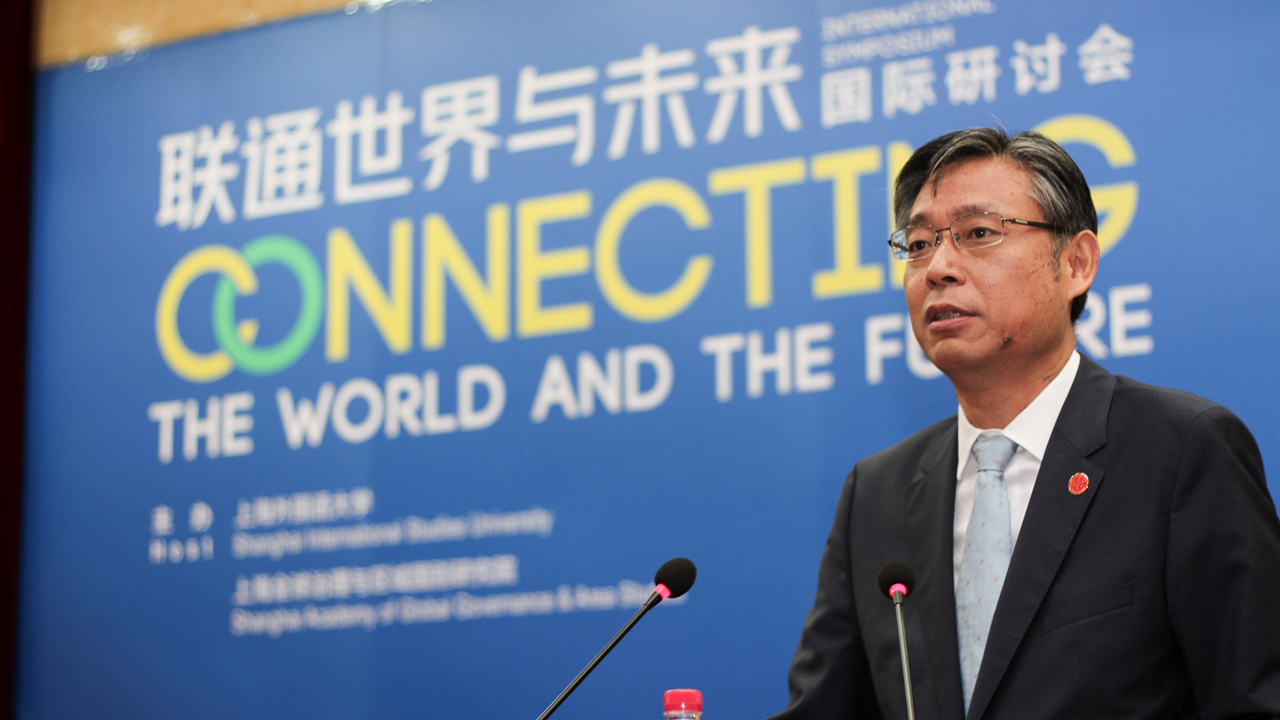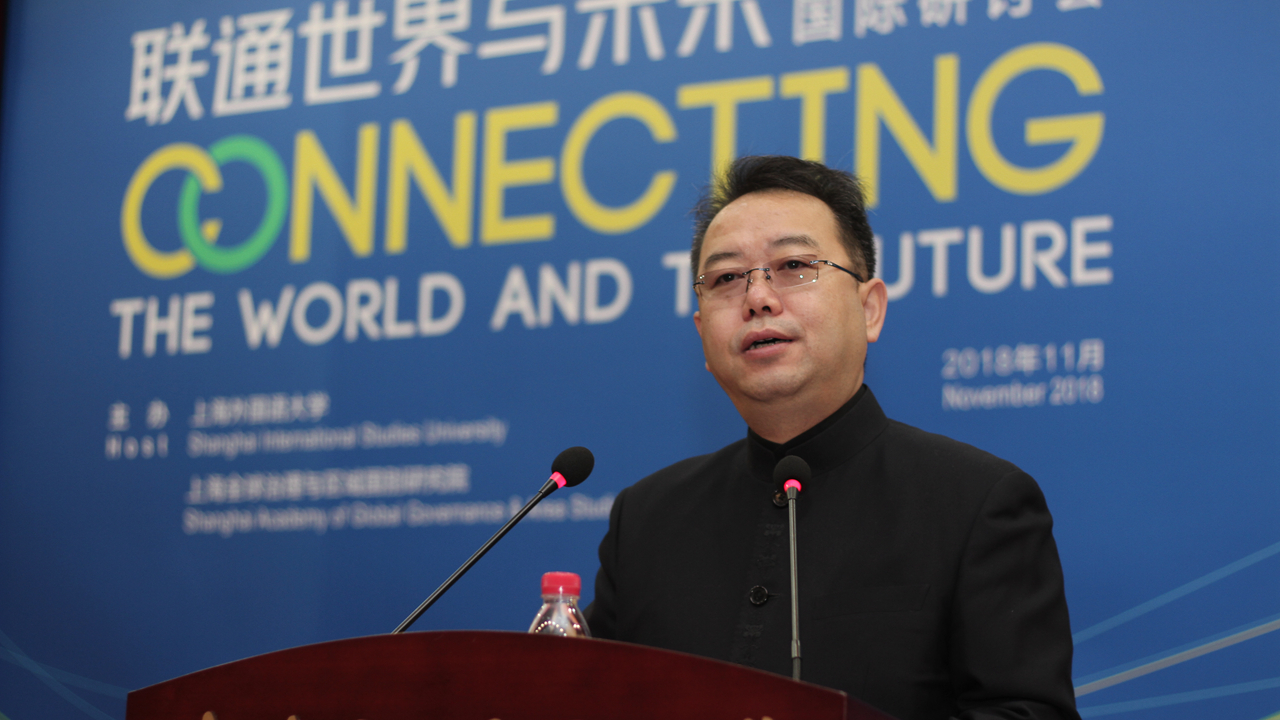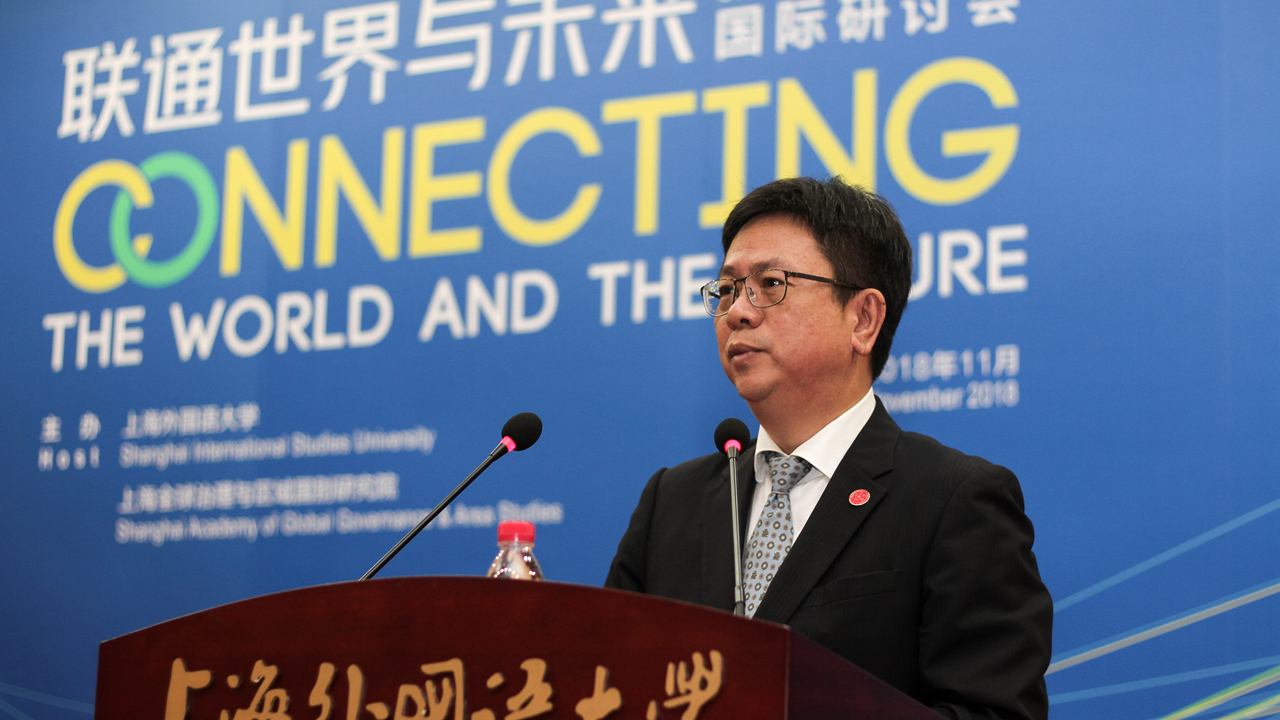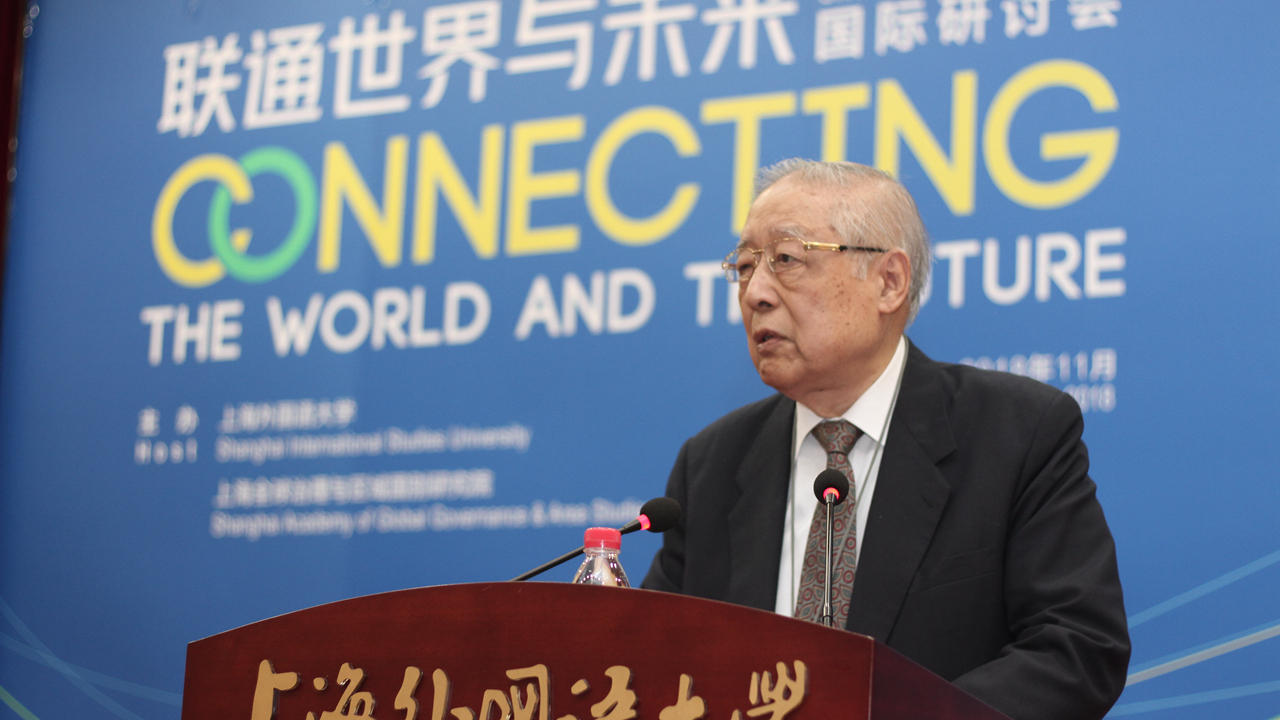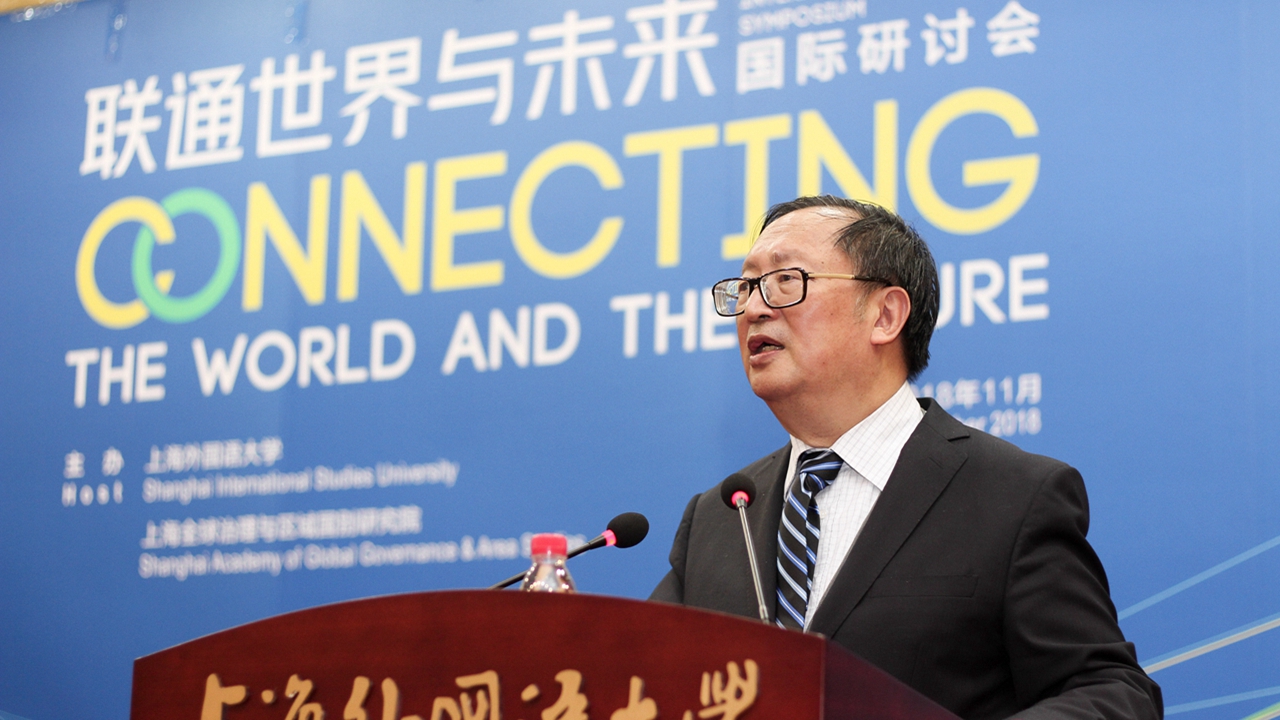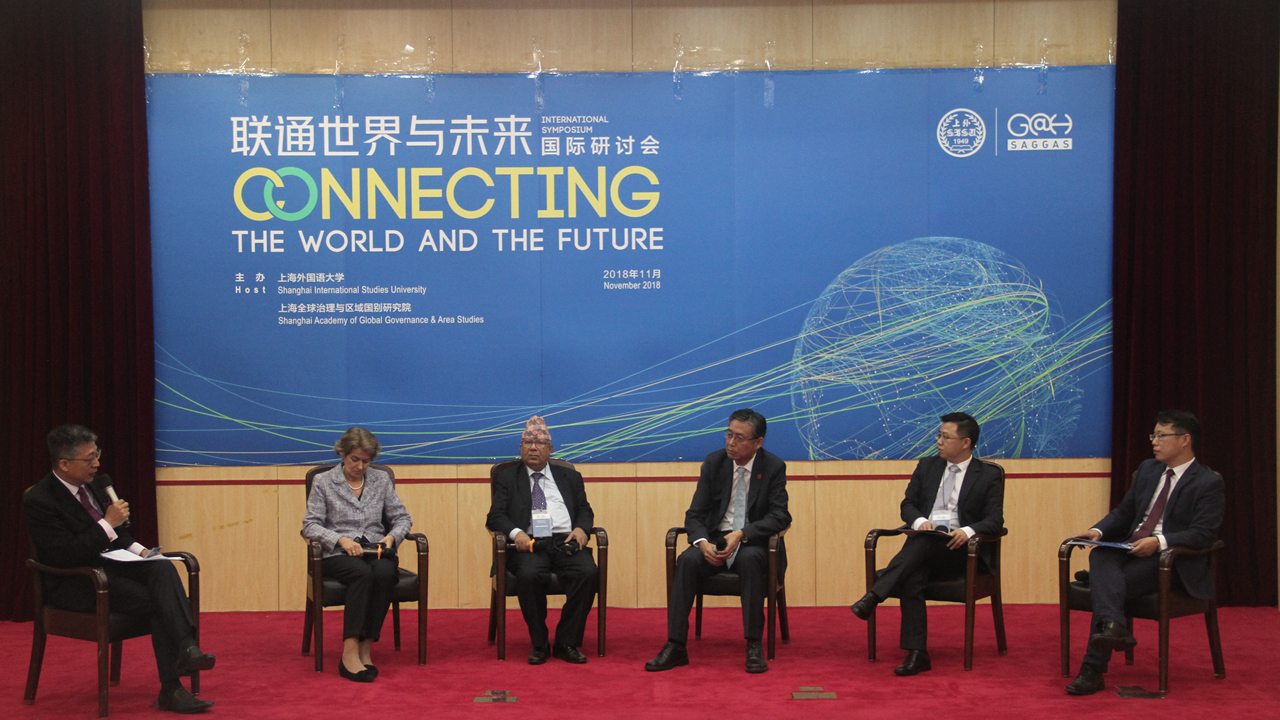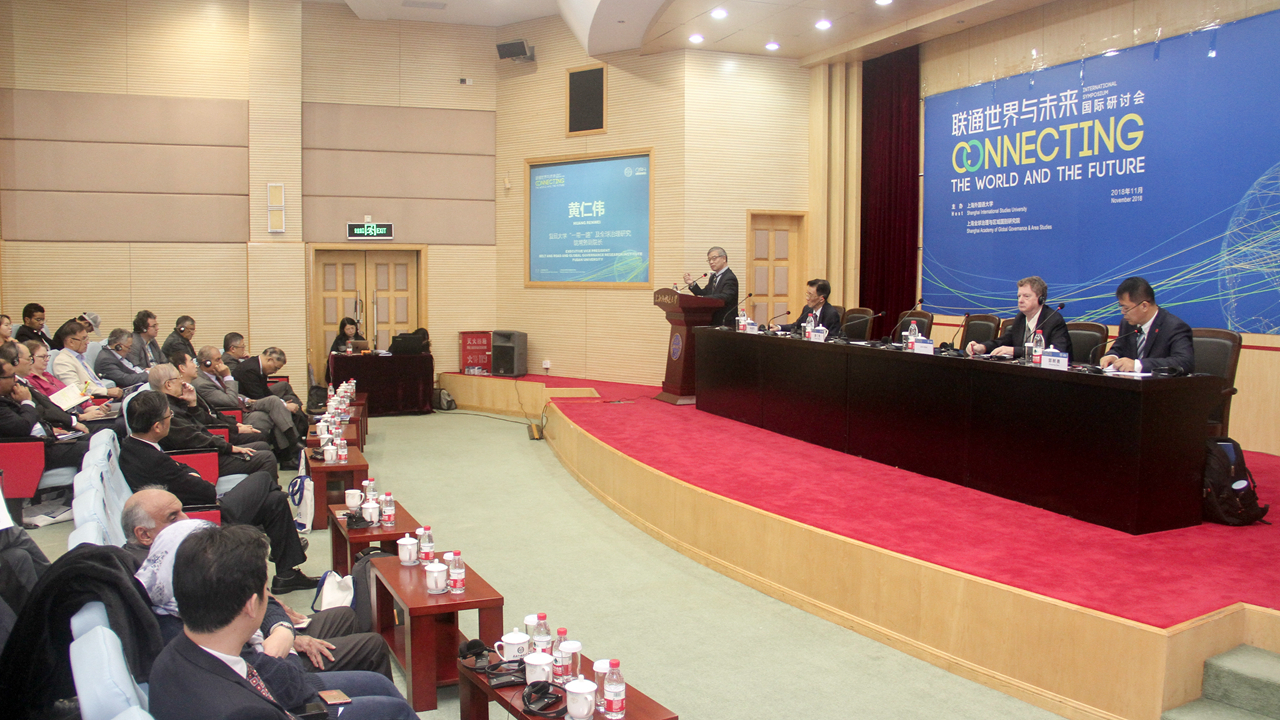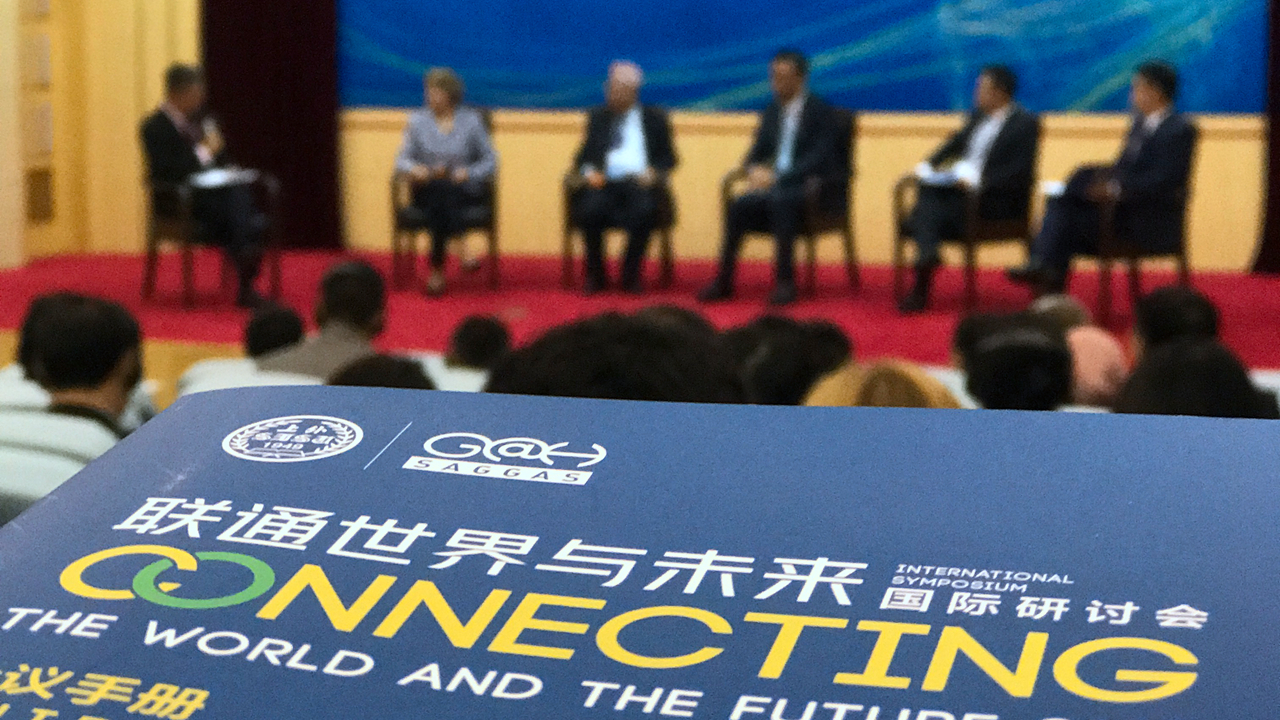O |
n November 11, 2018, Shanghai Academy of Global Governance and Area Studies (SAGGAS) hosted International Symposium on “Connecting the World and the Future” at Shanghai International Studies University (SISU). Attended by diplomats and scholars from both home and abroad, the symposium explored four major topics, including “Transition of the World and the Global Order”, “B & R Initiative and Countries along the Routes”, “Major Power Diplomacy with Chinese Characteristics and the New Pattern of International Relations” and “Global Governance and the Community of Shared Future”.
Hosted by Li Yansong, president of SISU, the opening ceremony featured keynote speeches given by Djoomart Otorbaev, former prime minister of Kyrgyzstan, Madhav Kumar Nepal, former prime minister of Nepal, Irina Bokova, former director-general of UNESCO, Kazuyuki Katayama, consul general of Japan in Shanghai,Yang Fuchang, former vice minister of Ministry of Foreign Affairs of China, and Yang Jiemian, chairman of the International Advisory Committee of SAGGAS and director of Academic Committee, Shanghai Institute for International Studies.
University Council Chair Jiang Feng extended a warm welcome to the attendees, expressing his hopes for SAGGAS to develop into a platform of global observation and innovation as well as a vehicle for the sharing of Chinese stories and insights. University Council Chair Jiang Feng extended a warm welcome to the attendees, expressing his hopes for SAGGAS to develop into a platform of global observation and innovation as well as a vehicle for the sharing of Chinese stories and insights. In his speech, Mr. Jiang pointed out that globalization concerned not only space, but also time. Faced with international vicissitudes, what people needed to do was embrace the future and view things from a global perspective, taking others’ interests into consideration rather than focusing on oneself only. It was mankind’s common aspiration to usher in a better future. However, sharing or contribution with a “my country first” mindset would do no good to problem-solving. After all, the precondition for connecting the world and the future is to build bridges between time and space, self and others, as well as elites and masses.
Li Yongzhi, deputy director of Shanghai Municipal Education Commission (SMEC), highlighted in his speech that Shanghai was striving to build itself into a center for international economy, finance, trade, shipping and science and technology innovation, as well as to boost its four brands—Shanghai Services, Shanghai Manufacturing, Shanghai Shopping and Shanghai Culture, so as to become a socialist, modern and international metropolis. Against this backdrop, SMEC has lent great support to the establishment of SAGGAS, the secretariat of which is located at SISU. SAGGAS, as an integrated hub of research, teaching and governance consultation, gains support from 52 area studies centers under Ministry of Education and 30 university think-tanks in Shanghai, and is open to universities and research institutes across the country, serving as an open platform for research, teaching and governance services. In the future, SAGGAS will prioritize the building of a distinctive high-level think-tank, a talent pool, and a platform and database of global opinions. Director Li, in his speech, also invited world-renowned scholars, think-tanks, research institutes and international organizations to carry out exchanges and cooperation with universities in Shanghai, as their insight and wisdom would contribute a lot to the development of Shanghai and China as a whole, and help to foster an international community which would be more “peaceful, developed, open, inclusive, balanced, and beneficial to all”.
Djoomart Otorbaev, former prime minister of Kyrgyzstan, congratulated Shanghai at the beginning of his speech on successfully holding the first China International Import Expo (CIIE), noting that the CIIE was a testament to China’s opening-up and connectivity. He stressed that the Belt and Road Initiative had injected new momentum into the future development of his country. When advancing connectivity with the world, China should strengthen mutual trust with the Belt and Road countries, and put soft power building high on its agenda, which would help the public better understand the Belt and Road Initiative as well as China, thereby creating more room for cooperation and jointly ushering in a more harmonious future.
Madhav Kumar Nepal, former prime minister of Nepal, delivered a keynote speech on democracy, political institutions and global governance. He put forward that democracy, good governance and the rule of law were the cornerstones of sustainable economic growth and social equality, and that mankind, being the major driver of sustainable development, was also the main beneficiary of it. Indeed, it had been increasingly widely accepted that global governance was all about cooperation and respect. With regard to the Belt and Road Initiative, Mr. Nepal laid emphasis on the following three points. First, the Initiative was of vital significance to the development of countries in Asia, Africa and Central and Eastern Europe, and could make the world a better place—more harmonious, inclusive and peaceful. Second, connecting Asia, Europe and Africa, the Initiative was able to pool the strengths of all parties and bring them great hopes. Third, the Initiative redefined “governance”, improved international relations and helped those relatively underdeveloped countries. When mentioning a community of shared future for mankind, Mr. Nepal stressed that this concept should be what people were in pursuit of despite all the challenges they faced today. Since countries had shared interests, it was imperative for them to fight for freedom and peace together, and to ensure that the future world was a place where later generations could live happily.
Irina Bokova, former director-general of UNESCO, stated in her keynote speech that SAGGAS was an important platform for expanding international academic exchanges and cooperation, and that challenges brought about by globalization could only be solved by global cooperation. She highly praised China’s contribution to implementing the 2030 Agenda for Sustainable Development, noting that China’s commitment to “100 poverty alleviation programs, 100 agricultural cooperation programs, 100 trade promotion programs, 100 ecological protection and fighting against climate change programs, construction of 100 hospitals and clinics, and construction of 100 schools and vocational training centers” was a powerful testament to the country’s efforts to promote innovative, coordinated, green, open, and shared development. Ms. Bokova also pointed out that the Belt and Road Initiative expanded people-to-people exchanges and cooperation on education and technology, advanced inclusive and sustainable development, and strengthened mutual understanding and trust among people and countries.
Kazuyuki Katayama, consul general of Japan in Shanghai, addressed the opening ceremony on behalf of Yasuo Fukuda, former Prime Minister of Japan. He stated that it was the right time to promote regional and national cooperation with the perspective of global governance. Both the government and the public of Japan had a strong interest in the Belt and Road Initiative. After Chinese Premier Li Keqiang visited Japan and Japanese Prime Minister Shinzo Abe visited China, the Japan-China relationship got back on to a normal track and embarked on a new stage. The two countries should work closely together to secure the peace in East Asia and to tackle the threats brought by international terrorism and North Korea nuclear issues, making East China Sea a sea of peace, friendship and cooperation.
Yang Fuchang, former vice minister of Ministry of Foreign Affairs of China, focused on Arabian countries. In his keynote speech, he emphasized that China and Arabian countries had a long history of friendship and two parties had always enjoyed strong political and economic ties. In addition, he believed that the Belt and Road Initiative, in accordance with the fundamental principle of planning together, building together and benefiting together, set the direction for international development and satisfied the needs of Arabian countries.
Yang Jiemian, chairman of SAGGAS International Advisory Committee and chairman of Shanghai Institute for International Studies Academic Council, elaborated on China’s relations with the rest of the world in the past, at present and in the future in his keynote speech. He stated that China was on its way to a peaceful rise. The government and the people made great efforts to adapt to the on-going global changes. SAGGAS was also established to improve the understanding of the changes. China followed the doctrine of Confucianism, Taoism and Buddhism. In pursuit of socialism with Chinese characteristics, it would spare no efforts to defend the principle of mutual respect, actively establish new partnerships, build a community of shared future for mankind, and deliver the benefits to all.
After the keynote speeches, a roundtable was held. Bokova, Nepal and Jiang were joined by Wang Dong from Peiking University and Jin Jiyong from SISU to discuss topics from New Liberalism to new international orders and from multilaterialsm to US-China trade dispute. The round table, which sparked many new ideas and insights, was moderated by Yang Rui from China Central Television. In the roundtable, they agreed that cooperation’ was a keyword for the modern world. Only cooperation can help us achieve our goals. We need cooperation rather than confrontation. All parties should communicate with each other, exchange ideas, work together and share the benefits. Not only should China abide by this, the entire world should join the force. “Responsibility” is a keyword for the future. The decision makers and the academia should shoulder the responsibility together to translate the world into a better place for all.
In the afternoon, participants from Kazakhstan, Russia, Japan, Lebanon, Morocco, Kyrgyzstan, Uzbekistan, Egypt and China exchanged views on “Transition of the World and the Global Order”, “B & R Initiative and Countries along the Routes”, and “Major Power Diplomacy with Chinese Characteristics and the New Pattern of International Relations” at three panel discussions. Wang Xianhua, director of the Institute for the Global History of Civilizations, SISU, Wang Dong, deputy executive director of the Institute for China-US People-to-People Exchange, Peking University, and Wang Youyong, executive dean of SAGGAS and director of the Office of Research Affairs, SISU, moderated the panels.
On November 12, John James Kirton, co-director of the G20 Research Group, University of Toronto, Huang Renwei, executive vice president of the Belt and Road and Global Governance Research Institute, Fudan University, and Zhu Weilie, honorary head of the Institute of Middle East Studies, SISU, delivered keynote speeches. After the speeches, experts from China, the US, and Sri Lanka explored the topic of “Global Governance and the Community of Shared Future”. Guo Shuyong, dean of the School of International Relations and Public Affairs, SISU, and Zhang Hongling, director of the Office of International Cooperation and Exchange, SISU, moderated the keynote speeches and the panel discussion respectively.
President Li said at the closing ceremony held afterwards that it was the mission and goal of all of the participants to connect the world and the future. He commented that the symposium had played an substantial part in advancing SAGGAS. The world was undergoing rapid and profound changes and was in dire need of a more balanced, comprehensive and rewarding system of global governance that could reflect the transformations of the global landscape and give more say to the emerging economies and developing countries. Joining hands with other countries, China should make its own contribution to the establishment of a fairer and more reasonable international order. President Li also shared his views on the Belt and Road Initiative. Connecting the past with the future, the Initiative was put forward by China but its benefits would be shared by the entire world. In line with the common interests, it would encourage all parties to tackle the global economic challenges in a coordinated and complementary manner. As for Chinese diplomacy and international relations, he believed that cooperation and mutual benefits, as stressed in major-country diplomacy with Chinese characteristics, should be the guiding principles of the policies of all aspects including politics, economy, security, culture and diplomacy. All countries should make joint efforts to build a new type of international relations and a new global landscape, based on win-win cooperation. China had been and would always be concerned about the world development. To build a community of shared future for mankind was the solution proposed by Chinese leaders based on their understanding of the global trend. It coincided exactly with China’s major-country diplomacy and provided “China’s wisdom” and “China’s solutions” to the maintaining of global ecological harmony and world peace, the transformation of global governance, and the establishment of an international order of justice and fairness. In the end, he called on the participants to continue work closely and together promote the influences of SAGGAS as a world famous think-tank.
The symposium was the first international conference held by SAGGAS. Founded in September 2018 under the support of China’s Ministry of Education and Shanghai Municipality, SAGGAS is designed, on the basis of the principle of “Global at Home”, to inform policy-makers, businesses and the public, and serve its multiple roles as a high-level think-tank, a talent pool and a platform and database of global opinions.


